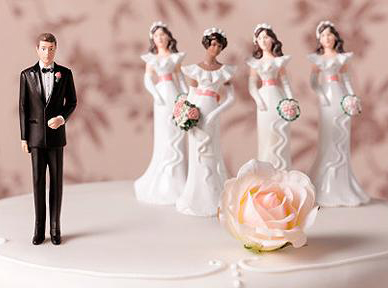|
Bountiful
was founded after World War II by Mormons opposed to their church's
rejection of polygamy, and the practice continues there to this day. As
far back as 1992, the BC government opted to do nothing after judging
that the courts would strike down anti-polygamy laws on grounds of
religious freedom. However, it gradually became impossible to ignore the
situation. In 2004, a woman originally "married" at age 15 to a
religious leader filed a human rights complaint. In 2005, another
religious leader held a "polygamy summit" at which he acknowledged
marrying underage girls ‒ then repeated his boasts a year later to Larry
King on CNN. In 2007,
a
special prosecutor was appointed to examine the possibility of
bringing charges, which ultimately led to the government referring the
issue of the law's constitutionality
to the courts.
On November 23, after 42 days
of legal arguments, Chief Justice Robert Bauman handed down a
335-page decision upholding the law (except as it might be used to
prosecute minors). The ban, he wrote, violates religious freedom but is
justifiable nonetheless in that its purpose is "the prevention of harm
to women, to children and to society" and "the preservation of
monogamous marriage." The ruling presumably clears the way for the
authorities to put an end to plural marriage in Bountiful and elsewhere.
Life in Bountiful
sounds appalling, with accusations of child marriage, abuse, the
"importation" of brides from abroad, the expulsion of "surplus" males,
etc. There is no question that much of what allegedly occurs in
Bountiful should indeed be illegal. But should polygamy itself be
included on that list? Is marrying several partners in itself a social
wrong? And even if it is, should criminal sanctions be used against
polygamists?
 Both
anecdotally and
statistically, polygamy appears to be correlated with the abuse of
women and children. One expert explained to a BC court that "as polygamy
increases, so do the rates of maternal mortality, teenage marriages and
births, sex trafficking and domestic violence [...] A rise in polygamy
is also associated with lower education opportunities for boys and girls
and greater inequity between men and women." The link seems plausible,
as polygamous communities appear to be patriarchal, authoritarian and
closed ‒ favourable ingredients for physical and psychological
mistreatment. But does it necessarily follow that polygamy itself should
be illegal?
Both
anecdotally and
statistically, polygamy appears to be correlated with the abuse of
women and children. One expert explained to a BC court that "as polygamy
increases, so do the rates of maternal mortality, teenage marriages and
births, sex trafficking and domestic violence [...] A rise in polygamy
is also associated with lower education opportunities for boys and girls
and greater inequity between men and women." The link seems plausible,
as polygamous communities appear to be patriarchal, authoritarian and
closed ‒ favourable ingredients for physical and psychological
mistreatment. But does it necessarily follow that polygamy itself should
be illegal?
Many of the things that happen in Bountiful that outrage us so ‒ "marriage"
of 12-year-old girls, forced marriage, human trafficking, physical
violence, etc. ‒ are already illegal. They would be no less so in the
absence of polygamy. Spousal abuse and rape occur in monogamous
relationships, too. Had Bountiful's patriarchs limited themselves to one
wife each, their actions would have been no less repugnant or illicit;
one child bride is enough for a lengthy prison sentence. And had they
decided not to "marry" their subsequent victims but only to force
themselves on them, those children would have been no less wronged.
Polygamy charges add little when one is already accused of violating a
young girl. And would not the threat of imprisonment actually dissuade
victims of non-consensual polygamy from coming forward?
Faced with this argument,
the BC government countered that it was "irrelevant" whether
monogamous relationships can also be abusive. Instead, the "real issue
is whether it occurs more in polygamy." This argument seems fair enough
on its surface, but taken to its logical conclusion its implications are
frightening: if a given family environment is shown to be more conducive
to socially undesirable outcomes, it should be prohibited.
If this is the kind of argument we want to rely on, where does that
leave single-parent families,
more likely to be poor? Or teen parents, whose children typically
start life
at a disadvantage? How should we view globetrotting couples, whose
children can face
unique difficulties? What about workaholic parents who raise
latchkey kids? More pointedly, should the legality, or even the
acceptability, of any of these arrangements really depend on an
empirical analysis of their average social impacts? Or should we more
properly see them as private matters in which the state has no business
unless and until someone actually does something criminal?
Another argument against polygamy is that
it degrades women. Of course, this assumes that we are talking about
polygyny (one man, multiple wives) rather than polyandry (the converse).
Many women quite reasonably find it degrading, as it implies that a wife
is a fungible commodity ‒ a status symbol or a collectible. Though
legitimate, these views are not reasons to ban the practice, any more
than they are reasons to criminalize pornography, strip clubs or sexist
beer commercials. Hate speech degrades ethnic minorities (indeed, that
is normally the point), but the emotional pain that it causes is not
sufficient grounds for banning it. The fact that certain behaviour is
upsetting is not enough to justify imprisoning those who engage in it.
Freedom is not just the right to do what is popular and normal; true
freedom includes the right to upset and offend without running the risk
of state repression.
|

